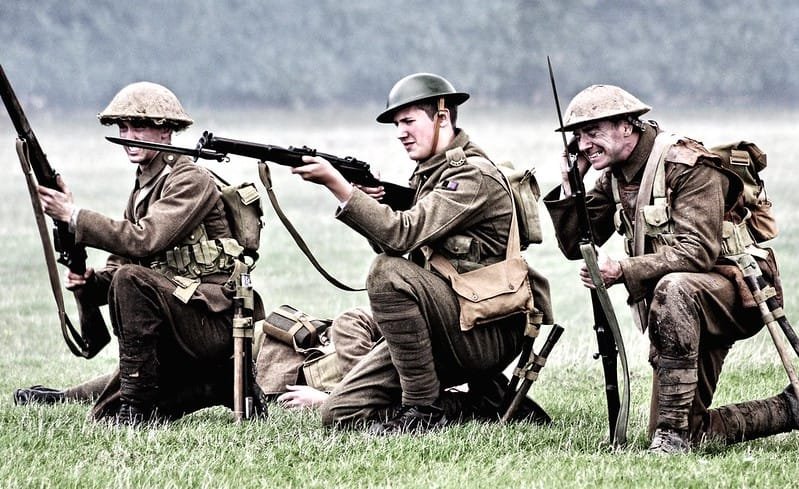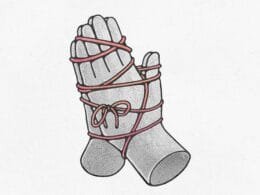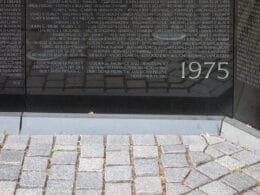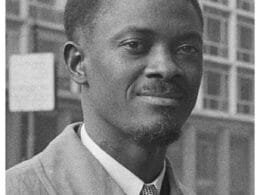The Scarlet Fields
Scarlet Fields: The Combat Memoir of a World War I Medal of Honor Hero presents a poignant account of the harrowing experiences endured by soldiers during one of history’s most devastating conflicts. Written by John Lewis Barkley, this combat memoir serves not only as a personal narrative of courage and sacrifice but also as a crucial historical document that sheds light on the broader themes of heroism, trauma, and resilience evident in World War I. Barkley’s recounting of events places readers directly into the trenches, effectively illustrating the brutal reality of combat that many soldiers faced.
Throughout the memoir, Barkley details his journey from a young recruit to a decorated veteran, capturing the emotional and psychological complexities associated with war. The text provides insight into his personal motivations, struggles, and the immediate impact of the soldier’s experience during the Great War. By relaying his encounters with the enemy, the camaraderie forged between soldiers, and the horrifying consequences of battle, Barkley enables readers to engage with the profound challenges encountered on the front lines. This deeply personal narrative reflects the trials many soldiers faced, marking it as an essential read for those looking to understand the individual experiences juxtaposed against the monumental scope of the war.
The historical context of World War I is not merely a backdrop; it is fundamentally interwoven with Barkley’s story. His experiences provide a unique perspective on the socio-political factors that shaped the conflict and its aftermath. As a recipient of the Medal of Honor, Barkley’s bravery exemplifies the valor displayed by countless individuals during this tumultuous period. Overall, Scarlet Fields serves as a critical resource for comprehending the emotional landscape of soldiers, making it a significant addition to the literature surrounding military history and personal memoirs.
The Life of John Lewis Barkley Before the War
John Lewis Barkley was born on January 16, 1894, in a modest environment that shaped not only his character but also his future decisions. Growing up in a small town, he was instilled with values of hard work and perseverance, which became integral to his identity. His parents, both hardworking individuals, emphasized the importance of education and civic duty, encouraging Barkley to aspire for something greater than his immediate surroundings. This early influence played a key role in molding his sense of responsibility and honor.
Barkley’s formative years were characterized by a strong sense of adventure and curiosity. From a young age, he displayed qualities of leadership and bravery, often engaging in activities that pushed him to develop skills necessary for survival and leadership. His childhood experiences, including outdoor adventures, fostered a deep appreciation for nature and camaraderie. These experiences solidified his desire to serve and protect, ultimately leading to his determination to join the military.
The societal context of America in the early 20th century also played a foundational role in Barkley’s decision-making. With World War I emerging as a significant global conflict, many young men felt a profound duty to enlist and contribute to the war effort. Barkley, influenced by patriotic sentiments and the ideals of heroism, found himself drawn to military service. Despite the challenges ahead, he was resolute, believing that the principles of honor and sacrifice were paramount.
As he prepared to enter the military, Barkley’s personal aspirations took shape. He sought not only to serve his country but also to embody the virtues of bravery and duty, ideals that would define his legacy. The combination of his upbringing, character traits, and the socio-political climate of the time laid the groundwork for the formidable soldier he would become, ultimately setting the stage for the remarkable chapters of his combat experiences chronicled in his memoir.
Enlistment and Training
John Lewis Barkley’s journey into Army life began with the enlistment process, a pivotal moment that would shape his future. Like many of his contemporaries, Barkley was driven by a profound sense of duty and patriotism, compelled to join the fight during World War I. The enlistment experience was not merely a formal procedure; it was filled with a whirlwind of emotions, ranging from excitement and fear to uncertainty about the challenges ahead. Soldiers were required to fill out various forms, undergo medical examinations, and ultimately commit to serving their country in a time of dire need.
Once enlisted, Barkley, like other recruits, underwent rigorous military training. This initial phase was crucial in preparing him for the harsh realities of combat. Training camps were established to instill discipline and endurance, where recruits faced both physical and psychological challenges. The physical aspect of training was demanding, with countless hours spent in drills, marches, and physical conditioning designed to enhance soldiers’ stamina and strength. This strenuous routine also paved the way for camaraderie among the men, as they bonded over shared struggles and experiences. The bonds formed in the training camp were foundational for the relationships that would develop in the trenches.
The emotional aspects of military training cannot be understated. Recruits were not only preparing their bodies but also their minds for the horrors of warfare. Many faced the harsh realities of death and loss as they contemplated leaving their loved ones behind. Barkley and his fellow soldiers learned to rely on each other for support, overcoming their fears through camaraderie. This initial period of training was not just an introduction to military life; it laid the groundwork for the profoundly transformative experiences they would encounter in the battlefield, shaping their identities as soldiers and men prepared to face the ultimate test of their valor.
Life in the Trenches
The daily life of soldiers in the trenches during World War I, as vividly depicted by John Lewis Barkley in “Scarlet Fields,” reveals both the harsh realities and the profound psychological toll of warfare. The trenches, often filled with mud, water, and the relentless menace of artillery bombardment, created an environment that was not only physically demanding but also emotionally draining. Soldiers endured bitter cold in winter and oppressive heat in summer, further complicating their ability to carry out their duties effectively.
The psychological impact on these soldiers was immense. The constant threat of death and injury, coupled with the sight of fallen comrades, led to profound mental strain. Barkley captures the essence of this psychological turmoil, detailing how fear and anxiety became constant companions in the trenches. The haunting noise of gunfire and explosion, while made worse by the close quarters of trench warfare, contributed significantly to the soldiers’ deteriorating mental health. Many experienced what would now be recognized as post-traumatic stress disorder, yet during that time, such conditions were not fully understood or acknowledged.
Amidst the chaos and discomfort, soldiers managed to form deep bonds with one another. These relationships, born of shared hardship and mutual reliance, provided a vital lifeline. Barkley’s accounts depict camaraderie as a key element of survival; soldiers often relied on one another for emotional support and encouragement. They shared stories, hopes, and even moments of levity amidst the onslaught, which helped mitigate the grim reality of their circumstances. Ultimately, Barkley’s memoir serves to illuminate how life in the trenches was characterized by both harrowing challenges and profound human connection, showcasing the duality of the wartime experience.
Courage and Heroism: The Actions that Earned the Medal of Honor
John Lewis Barkley, in his memoir “Scarlet Fields,” provides a poignant account of the harrowing experiences that defined his journey during World War I. His actions on the battlefield, which ultimately earned him the Medal of Honor, exemplify extraordinary courage and heroism in the face of adversity. One particular instance stands out during a pivotal engagement, where his strategic acumen and unyielding resolve were tested to their limits.
During the battle at the Meuse-Argonne, Barkley was tasked with leading a group of soldiers through a heavily fortified enemy position. Faced with overwhelming odds, he made the courageous decision to advance, aware that his men relied on his leadership. Barkley demonstrated remarkable bravery by taking the lead, exposing himself to enemy fire in order to provide cover and support to his comrades. His selfless actions not only inspired his fellow soldiers but also exemplified the true essence of valor.
Moreover, Barkley’s strategic decisions during the confrontation played a crucial role in the success of this critical operation. He skillfully directed his men through complex terrain and devised plans to outmaneuver the enemy, greatly enhancing their chances of survival and victory. Moreover, when one of his soldiers was injured and left vulnerable, Barkley did not hesitate to rush into the line of fire to bring his comrade to safety, putting his own life at risk in the process.
The culmination of such acts of bravery underlines the significance of Barkley’s contributions to the war effort and showcases the qualities that the Medal of Honor represents. His memoir not only recounts his personal sacrifices but also serves as a testament to the courage and heroism that define the spirit of those who serve in the military. Barkley’s narrative provides an enduring reminder of the profound impact of such bravery in the chaotic landscape of war.
The Aftermath of War
The return home from the battlefield often heralds not just relief but the beginning of a complex journey for many veterans, including John Lewis Barkley. The immediate effects of World War I on Barkley were significant, as he faced numerous challenges upon reintegrating into civilian life. Like many veterans, he was confronted with physical injuries that altered his daily existence and mental health issues stemming from the traumatic experiences of combat. These conditions were not unique to Barkley; they were a pervasive problem affecting countless soldiers returning from the war.
Physical injuries sustained during combat often required extensive rehabilitation, while the mental scars of war led to conditions such as what would later be recognized as post-traumatic stress disorder (PTSD). Barkley’s struggle with these invisible wounds was indicative of a broader issue confronting veterans. The lack of adequate mental health resources during the post-war period exacerbated the suffering of many, leaving them to navigate their trauma largely alone. Such challenges also contributed to a growing awareness of the importance of mental health in the veteran community, sparking conversations that were long overdue.
The transition from soldier to civilian was further complicated by societal expectations and the stigma surrounding mental health struggles. For Barkley, his experiences in the war reshaped his perspective on violence, conflict, and the notion of heroism. Though he received a Medal of Honor, which marked him as a war hero, Barkley’s views on war became increasingly nuanced. His reflections on the futility of conflict and the importance of peace serve as a reminder of the long-lasting impact war has on individuals, not just in terms of physicality but in shaping broader societal ideals and values. The aftermath of war leaves profound marks, and for Barkley, these experiences were pivotal in molding his future endeavors and philosophies.
Legacy of Scarlet Fields
John Lewis Barkley’s memoir, Scarlet Fields, stands as an important testament to the experiences and sacrifices of soldiers during World War I. The book enriches the canon of war literature by providing an authentic glimpse into the battlefield, thus presenting readers with an unfiltered perspective on the harsh realities of armed conflict. Barkley’s narrative transcends mere historical recounting as it delves into the profound psychological and emotional toll that war exacts on individuals. By exploring themes such as bravery and sacrifice, Scarlet Fields captures the essence of the human experience during one of history’s most tumultuous periods.
The relevance of Scarlet Fields today cannot be overstated. As contemporary readers grapple with ongoing global conflicts, the memoir serves as a reminder of the poignant costs of war and the valor displayed by those who serve in uniform. This work is especially vital in an era where narratives surrounding military service can often be oversimplified or politicized. Barkley’s portrayal of his fellow soldiers—grounded in shared camaraderie and mutual respect—invites readers to reflect on the moral complexities of war. Such narratives encourage empathy, fostering a deeper understanding of the sacrifices made in service to one’s country.
Preserving memoirs like Scarlet Fields is important for future generations, as they serve as historical documents that humanize the statistics often associated with warfare. By ensuring that these personal accounts remain accessible, we can cultivate a collective memory that honors those who have fought, endured, and ultimately sacrificed for their beliefs. As society continues to navigate the implications of war, the insights gleaned from Barkley’s experiences will remain vital in fostering a comprehensive understanding of not just war, but also resilience and the complexities of the human spirit.
Critical Reception and Impact
Since its publication, “Scarlet Fields: The Combat Memoir of a World War I Medal of Honor Hero” by John Lewis Barkley has received a mixed yet largely positive critical reception. Historians have praised the memoir for its authentic portrayal of the experiences faced by soldiers during the Great War. Barkley’s personal narrative provides an intimate view of the emotional and physical challenges confronting World War I veterans, allowing readers to gain a deeper understanding of the conflict’s ramifications.
War veterans have also found significance in Barkley’s story, relating their personal experiences to the author’s vivid recounting of battlefield heroism and the psychological toll of warfare. Such testimonials highlight the book’s role in fostering a sense of solidarity among veterans while encouraging open discussions about the challenges of reintegration into civilian life. The memoir serves as a bridge between generations, emphasizing the need to honor and remember the sacrifices made by those who fought in this monumental conflict.
Literary critics have recognized “Scarlet Fields” not only as a personal account but also as an essential educational resource. Teachers and educators have effectively integrated the memoir into curricula focusing on World War I, providing students with an exemplary piece of narrative history. By utilizing Barkley’s vivid descriptions and emotional authenticity, the memoir enhances the comprehension of historical events and helps to contextualize the sacrifices made by soldiers. As a result, “Scarlet Fields” has become a significant text in commemorating the heroism and resilience of World War I veterans.
In conclusion, the critical reception of “Scarlet Fields” underscores its multifaceted impact—ranging from historical insight, advocacy for veterans, to educational relevance, ensuring the legacy of those who served is not forgotten.
Concluding Thoughts on John Lewis Barkley’s Journey
John Lewis Barkley’s journey, as recounted in his memoir ‘Scarlet Fields’, serves as a poignant reminder of the valor and sacrifices made by soldiers during World War I. Through a detailed narrative, Barkley not only shares his personal experiences on the battlefield but also encapsulates the broader struggles faced by countless servicemen who fought valiantly for their country. His accounts highlight the raw realities of combat, interspersed with moments of courage and camaraderie that are emblematic of military service.
The lessons derived from Barkley’s experiences extend beyond the mere recounting of events. They emphasize the importance of understanding the human cost of war, the emotional and psychological impacts on veterans, and the legacy they leave behind. As readers engage with his story, they are prompted to reflect on the implications of military service, considering not just the heroism but also the sacrifice involved. This memoir invokes a sense of respect and gratitude for those who served, reminding us of the collective history shaped by their actions.
Barkley’s journey is significant in the context of honoring the memories of all veterans, as it sheds light on personal narratives that often go untold. The bravery demonstrated by him and his contemporaries is not solely confined to the pages of history; it resonates with contemporary discussions on military service and remembrance. The detailed portrayal of fears, hopes, and the stark realities of the war manifests the spirit of resilience inherent in soldiers. Thus, as we analyze Barkley’s journey through ‘Scarlet Fields’, we acknowledge not just his heroism but also the universal truths about courage, sacrifice, and the enduring impact of war on individuals and society.




